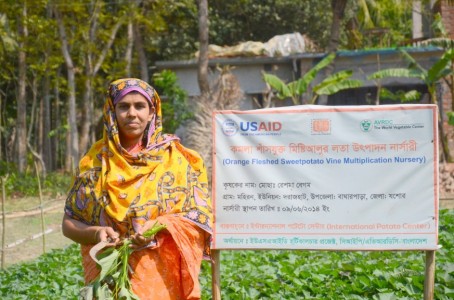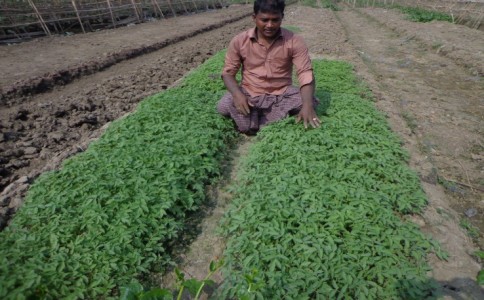The International Potato Center (CIP) Horticulture project in Bangladesh received national recognition when two of its participating farmers; Reshma Begum an orange fleshed sweetpotato (OFSP) vine nursery owner and Billal Hossain a tomato farmer, were each honored with a prestigious AGROW award. Bestowed by Standard & Chartered Bank the award seeks to recognize outstanding contributions to the agriculture sector.

Award will encourage more women
Reshma Begum is one of 300 women farmers trained by the Feed the Future USAID funded CIP horticulture project in vine multiplication in nursery for producing healthy/disease free planting material. Through her training she was able to establish a nursery and begin selling vines to her local community. While the average nursery produces 11,000 vine cuttings for sale, Reshma’s nursery produced a whopping 50,000. Farmers like Reshma are helping to revolutionize the taste for OFSP in southern Bangladesh.
Until recently sweetpotato was seen as crop to be relied on in times of distress—drought or economic hardship. It only fetched a modest price of 7 taka ($.09 USD) a kilo, and few consumed it on a routine basis. Through farmers like Reshma who made the vines more readily available on the market and a robust sensitization program that included mobile texting, TV broadcasts, farmers’ field days, and school taste testing, the demand for OFSP has increased dramatically. OFSP farmers now fetch as much as 21 taka ($.27 USD) a kilo for their crops at the mill gate. Since OFSP vine multiplication requires minimal land it has also been a boon for women who do not often have access to large parcels. Prior to the project Reshma’s monthly earnings were 500 taka ($6.47 USD), but since the inception of her OFSP nursery she is now averaging ten times that amount at 5,000 taka ($64.69 USD).
Reshma was particularly excited to receive the award from a fellow woman, the Minister of Agriculture Begum Matia Chowdhury. “This award will encourage more women to establish OFSP vines and roots and thus provide women with an income earning opportunity, while promoting consumption of this nutritious crop, and helping to eliminate malnutrition,” Reshma says.
Reshma plans on allocating the award money she received to: lease some land to increase her nursery, purchase some goats and poultry, and continue to invest in her children’s education.
An average of 80-90% of tomatoes are imported during the summer months in Bangladesh causing the market prices to sky rocket to 150-200 taka ($1.93-$2.57 USD) from the winter price of 10 taka ($.13 USD) a kilo. Until CIP, in partnership with the Bangladeshi Agriculture Research Institute (BARI) and the World Vegetable Center (AVRDC), introduced a heat-resistant seed variety and provided extension activities to train 2,000 farmers in summer vegetable production, few farmers were able to take advantage of the more lucrative summer selling season.
Summer tomatoes are more labor intensive and require modest investments to construct shelters to protect the plants from rains— factors that made many reluctant to test tomatoes in their fields. CIP recruited farmers who could demonstrate the economic impact of farming tomatoes to their neighbors. Billal Hossain, was one such farmer. The dramatic increase in his monthly income during the summer months speaks for itself— since adopting summer tomato farming Billal’s earnings have gone from 5,000 taka ($64.69 USD) a month to 35,833 taka ($463.62). As a result interest in tomato farming in his community is quickly spreading and Billal has personally trained an additional 45 farmers in summer tomato cultivation.
“Expansion of new technology of crops is increasing day by day, by which people are also benefitting,” Billal says. “Many of them are purchasing land, building houses, and eliminating unemployment. Many are spending more money for their children’s education.”
Key to Billal’s success is his active participation in the market. Through CIP Horticulture trainings Billal and farmers like him have learned how to organize and exchange market information and negotiate contracts with help from CIP and its partners to access regional and local markets. While CIP has helped to facilitate market analysis for summer tomatoes— knowledge that farmers like Billal can now apply to other crops since through established relationships that will help with the free flow of vital market information.
Similar to Reshma, Billal is investing his earnings to lease more land and expand his tomato cultivation. He also plans on investing in small businesses like rice and jute and use some of the money for household expenses.
“I am feeling very happy which I cannot express in words,” says Billal. “When I first heard about the award I felt like a proud farmer. I never thought that I will get such a prestigious award but if one cultivate properly and work hard he/she will get good results.”
AGROW recognition will help promote the project

“It is a great honor for the project that our work has been recognized,” says Horticulture project Chief-of-Party Dr. Shawkat Begum. “(The news of the award) will definitely create lots of vibration in the respected communities. If farmers see that they are earning money and it is beneficial to them they will never give up.”
Communication has been integral to the project’s success. While the OFSP and summer tomato varieties were available in Bangladesh prior to the project, they were not being used because farmers did not know of their existence and were not aware of the technologies that would bolster their yields. The Horticulture project has been actively working for the past four years to mobilize 100,000 farmers and get communities to adopt OFSP consumption.
“Communication is very important for spreading your word and helping to understand and accept technology,” says Dr. Shawkat. “The award is another platform to continue to communicate the importance of adopting these types of technologies.”
CIP congratulates all the winners and thanks the AGROW awards for recognizing the achievements of its farmers.
The Horticulture Project supported by the United States Agency for International Development (USAID) under its Feed the Future initiative, is using potato, sweetpotato and target vegetables to improve the food security, nutrition and incomes of smallholders.
